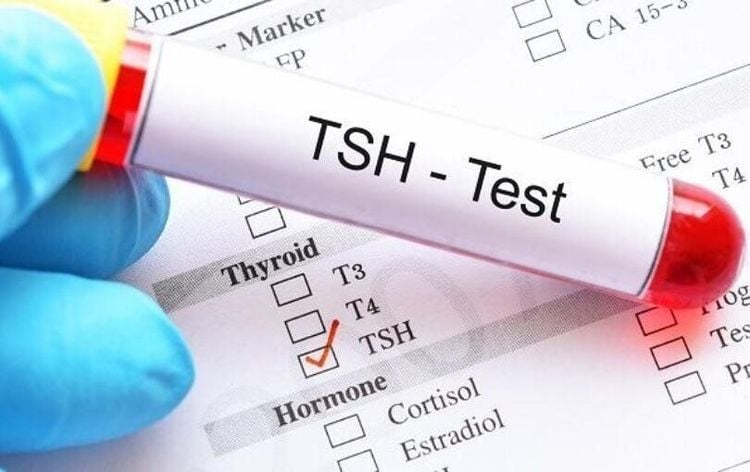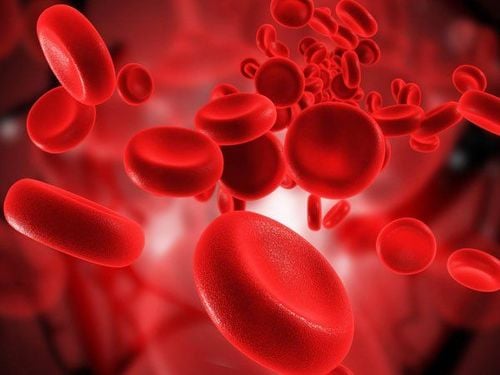This is an automatically translated article.
Congenital metabolic disorder is one of the abnormalities that can be seen in some newborns. This pathology appears before the child is born and is characterized by the ineffective functioning of the metabolic reactions of groups of substances in the body. So when the child is tested to diagnose congenital metabolic disorders, what should be done?
1. What is congenital metabolic disorder?
Many mothers bring their children to the doctor and find out that they have congenital metabolic disorders in different situations. In typical cases, mothers often complain about digestive disorders when starting to introduce solid foods to babies, that is, adding many other groups of substances besides breast milk such as proteins, sugars and fats. Babies still develop normally during the period of breastfeeding, but when they start to eat solid foods, unusual symptoms such as vomiting, diarrhea, even high fever and lethargy may appear. This is the familiar context of children with congenital metabolic disorders.
Congenital metabolic disorders are abnormalities in the metabolism of substances in the body that appear since the baby is still in the fetus. The body's metabolism of basic nutrients occurs before birth, starting after infancy during the first 8 weeks of pregnancy. Each substance is broken down into simpler components for the body to absorb and use thanks to a specific enzyme. The human body has many distinct enzymes that perform different roles. Enzymes are essentially protein chains whose production depends on gene sequence regulation. Specific genes will regulate the synthesis of the corresponding specific enzymes. For any reason, when there is a mutation in the coding segments in these regulatory genes, it will affect the production of enzymes involved in the metabolism. The enzymes produced may not be of sufficient quantity or of poor quality. The metabolic stage corresponding to the defective enzyme will be disturbed and cause inborn metabolic disorders. When suffering from congenital metabolic disorders, children are at risk of experiencing nutritional imbalances, deficiency of this substance while excess of some other substances in the body. Even children with congenital metabolic disorders may contain substances that have never appeared and are harmful to the body.

Chuyển hóa các chất dinh dưỡng bắt đầu từ sau giai đoạn phôi thai trong 8 tuần đầu tiên của thai kỳ.
Congenital metabolic disorder is a disease that can be passed on to the next generation. The inheritance of congenital metabolic disorders is predominantly autosomal recessive, with a small number of X-chromosomal recessive inheritance. Children who carry the disease gene but do not show clinical symptoms are also noted. The detection of congenital metabolic disorders is necessary to limit the transmission of this disease in the community. In addition, diagnostic tests for congenital metabolic disorders are also necessary measures to improve the effectiveness of later treatment.
Find out more information about the dangers of congenital metabolic disorders, please see HERE.
2. Tests to detect congenital metabolic disorders
The detection of congenital metabolic disorders in the form of children with real disease or healthy children carrying disease genes plays an important role, helping to reduce the incidence of the disease in the community and improve the health status of those who have the disease. unlucky children get sick. Clinically, the doctor may order the following tests to screen and detect congenital metabolic disorders:
Quantitative G6PD test: this is an enzyme present in red blood cells, responsible for role in glucose metabolism and maintaining the stability of red blood cell membranes. The child has blood drawn from the heel for testing. In children with G6PD deficiency, red blood cells become fragile, especially when the body has an infection or uses drugs that affect the integrity of the red blood cell membrane such as quinine, sulphonamides, aspirin. Red blood cells are important blood cells responsible for transporting oxygen throughout the body. Deficiency of G6PD enzyme makes children prone to anemia, adversely affecting physical and intellectual development. Quantitative TSH Test: The pituitary gland is the endocrine organ responsible for the production of the hormone TSH. Its main task is to stimulate the secretion of thyroid hormone, which plays a major role in regulating and promoting the growth of the child's body. Children with congenital hypothyroidism often have abnormal TSH quantitative test results. The baby's blood is taken for testing around the 3rd to 5th day after birth to rule out pseudo-elevated TSH from the mother. Children with congenital hypothyroidism are short and intellectually undeveloped. If not detected early in the first 3 months of life, the child will be at risk of physical and intellectual retardation later in life.

Xét nghiệm định lượng TSH giúp phát hiện rối loạn chuyển hóa bẩm sinh
PKU test: The purpose of this test is to detect the presence of phenylketone. The baby's blood was collected on the 3rd day after birth from the heel. PKU or phenylketonuria is an inherited disorder caused by a deficiency of the enzyme phenylalanine hydroxylase. This enzyme is responsible for converting the amino acid phenylalanine to tyrosine, which inhibits the metabolism of phenyl ketones. Therefore, in children with PKU, phenylketon levels are higher than normal due to tyroxin deficiency. Children with this condition are often advised to change their diet to foods that are low in phenylalanine. See more: Is congenital metabolic disorder hidden until adulthood?
Congenital metabolic disorders are dangerous diseases and can leave complications, even risk of death for children. However, the disease can be detected early with postpartum diagnostic tests such as a heel spur. Therefore, parents should choose reputable clinics and hospitals to give birth and screen for common diseases in babies for timely examination and treatment.

Hệ thống Bệnh viện Đa khoa Quốc tế Vinmec là địa chỉ tin cậy để bao mẹ cho trẻ nhỏ và trẻ sơ sinh đến thăm khám va điều trị
G6PD enzyme deficiency test Quantitative test of TSH , T3, T4 to diagnose congenital hypothyroidism 17-OHP test to diagnose congenital adrenal hyperplasia. The above tests are part of the Maternity package at Vinmec (except for the Hearing Screening test which is not included in the maternity package). Customers who register for Maternity Package at Vinmec will be fully tested, prenatal care - during and after birth for both mother and baby. In addition, the hospital still provides newborn screening service for customers who are not registered to give birth at Vinmec but have a need.
Please dial HOTLINE for more information or register for an appointment HERE. Download MyVinmec app to make appointments faster and to manage your bookings easily.













